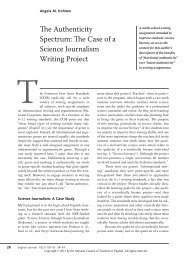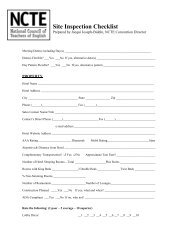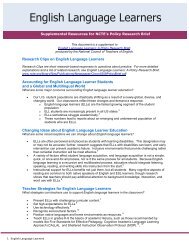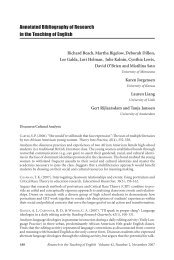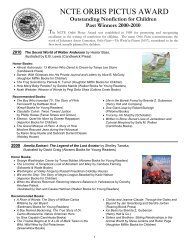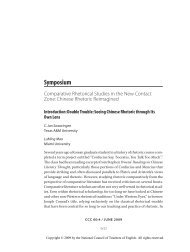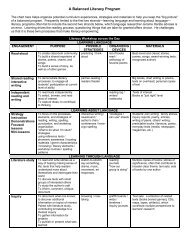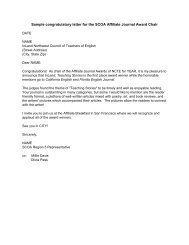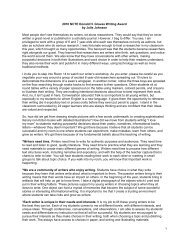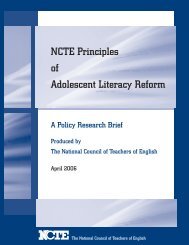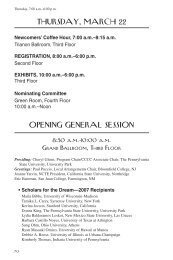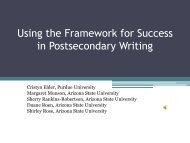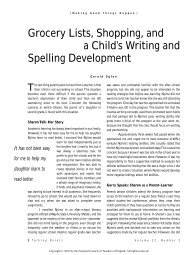1 Float Like a Plane, Sting Like a Bomb: The Ethics of US Drone ...
1 Float Like a Plane, Sting Like a Bomb: The Ethics of US Drone ...
1 Float Like a Plane, Sting Like a Bomb: The Ethics of US Drone ...
You also want an ePaper? Increase the reach of your titles
YUMPU automatically turns print PDFs into web optimized ePapers that Google loves.
If an argument could be made for Muhammad Ali actually possessing “specialresources” endowed to him by God, they would be his “enduring rhetoric [that] providesa model for analyzing texts and social movements invoking the paradox <strong>of</strong> the violence innonviolent civil disobedience” (Butterworth and Gorsevski 50). But what does this mean,violence in nonviolent civil disobedience? Basically, even though Ali was a boxer, asport and occupation based completely on violence, he worked nonviolently for peace.For example, in April 1967, Ali was drafted to participate in the Vietnam War, aconscription that he denied to comply with. After being taken to the United States ArmedForces Examining and Entrance Station in Houston, Ali stood in a straight line with otherdrafted individuals and his name was called; in a nonviolent resistance, he did not stepforward, a felony under the Universal Military Training and Service Act (Hauser 169).Remarking on his summons, Ali stated, “If I thought goin’ to war would bring freedom,justice and equality to twenty-two million Negroes, they wouldn’t have to draft me, I’djoin tomorrow” (Hietala 138). This type <strong>of</strong> behavior, this exhibition <strong>of</strong> impetuousness anddefiance dissolved many political and cultural norms at the time (Butterworth andGorsevski 54). A recent study <strong>of</strong> the anti-war movement during the Vietnam War givesevidence to Ali’s claim <strong>of</strong> the war being disproportionate in its draft towards minorities,showing that double the amount <strong>of</strong> African Americans were inducted by the draft thanwhites (Ernest and Baldwin 125).What Ali was able to do through his nonviolent rhetoric that is still relevant to thisday was successfully make millions <strong>of</strong> people “bear witness” to the violence andirrationality <strong>of</strong> war. For example, say you are watching the news with a roommate andthe news anchor, within her nicely lit and air conditioned studio, talks in a monotoneabout the deaths <strong>of</strong> civilians in a Pakistani market by a drone strike, and your roommateimmediately changes the channel, not giving the terrible story another thought. Yourroommate doesn’t understand the gravity <strong>of</strong> that devastation any more than the newsanchor does; neither understands the significant socio-economical problems that thedrone strike has caused in that area. How about the man sitting behind the joystick, theNintendo-war-controller, pressing the buttons to release the Hellfire missiles like Mari<strong>of</strong>iring at Bowser? Though the drone operator <strong>of</strong> all people probably knows the extent <strong>of</strong>the devastation he is causing, he refuses to think about it, he hides the truth from himself.<strong>The</strong> drone “pilot,” the unenthusiastic anchor, your roommate—they are all complicit.Shoshana Felman, influential in raising issues connected with Holocaust testimony andwhat is called the “crisis <strong>of</strong> witnessing,” says that those that misunderstand or hide whatthey see are unable to take that information and “translate…[it]…spontaneously andsimultaneously into meaning” (Felman 212). Famous psychologists Sigmund Freud andJacques Lacan described this as disavowal—a defense mechanism in which a personrefuses to recognize the reality <strong>of</strong> a traumatic perception (Evans 44).Through speeches recited on college campuses, Ali urged thousands <strong>of</strong> students tobear witness to the problems <strong>of</strong> integration and segregation, hate, and the Vietnam War.In one such speech, he links the violence in Vietnam caused by the war to the violence inthe states; he stated that he would rather fight what was going on in a legal way. Not bywar in a foreign country, but by nonviolent resistance right here in the United States.“Whatever the punishment, whatever the persecution is for standing up for my beliefs,even if it means facing machine-gun fire that day, I’ll face it…” (Hauser 187). Through5



